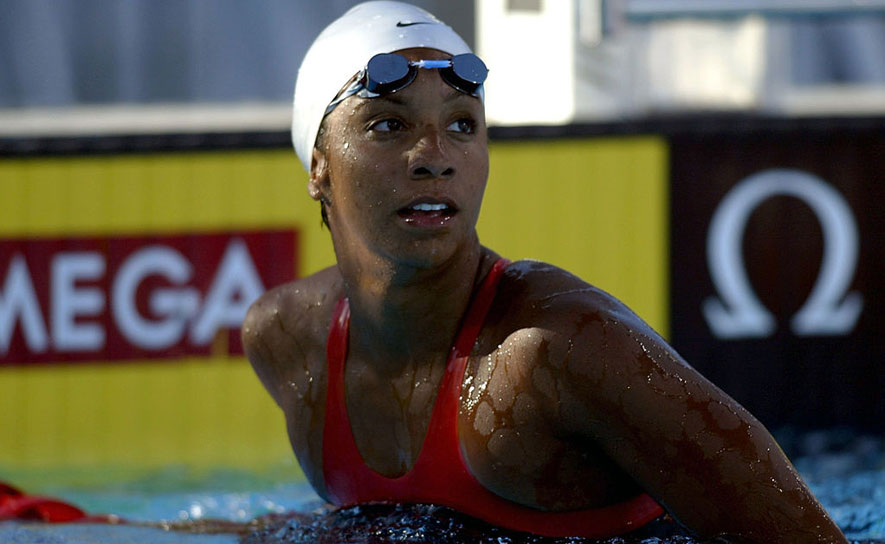USA Swimming News
Maritza McClendon: The Trailblazer Who Nearly Wasn't

by Tom Slear//Contributor
Maritza (Correia) McClendon, or “Ritz” as she is often called, swam her way to some impressive firsts among black American women: She was the first to have a world record when she anchored the short-course 400-meter medley relay at the NCAA championships in 2000. She was the first to set an individual American record (50-yard free, 2002 NCAA’s). She was the first world champion (2003, 400 free relay). And for what she is best known, she was the first to make an Olympic team and win an Olympic medal (2004, silver, 400 free relay).
And all of it came within a hair’s width of not happening.
McClendon’s father, a Guyana native who moved the family to Puerto Rico, where Maritza was born, and then to Florida to accommodate his animal feed business, was a promising athlete whose ambitions were thwarted by a knee injury. Maritza suffered the consequences of his unfulfilled dreams.
“He wanted me to be successful, he just overdid it,” is how she kindly assesses the family dynamic. “It was definitely a rough relationship.”
The 2000 Olympic Trials set up the unavoidable train wreck. In retrospect, Maritza’s chances of making the Olympic team, and becoming the first American man or woman of color to do so, were slim. She was coming off a brilliant freshman season at the University of Georgia, but she was young, and her success to that point had mostly been in short course. Maritza herself concedes her confidence was tenuous. Nevertheless, her father envisioned bright lights. After an 18th place in the 100 free that followed a 34th in the 200 free, he handed her a plane ticket. She had embarrassed the family, he told her. She was going home. There would be no 50 free.
Maritza fell into a funk. She seriously considered quitting. The support and encouragement of her Georgia teammates saved her swimming career. She was back in the hunt seven months later as shown by her anchor leg on the 400 free relay at the NCAAs. Over the last two laps she passed two other swimmers to give Georgia the team title over Stanford by 1 ½ points. It was one of the most remarkable swims ever at an NCAA swimming championships, whether men or women.
Yet it wasn’t until the NCAAs the following year that McClendon felt she gained the confidence needed to go big time. In the 50-yard free the first day of the competition, she broke the eight-year-old American record held by her childhood idol, Amy Van Dyken.
“I’m most proud of making the Olympic Team,” McClendon says, “but a close second was that American record. I felt I was really on to something. That was the ah-ha moment.”
But it wasn’t too long after that she started feeling pain in both of her shoulders. She toughed it out. By the time of the Olympics in 2004, her shoulders were on fire. Even lightweight tasks, such as lifting a soda can or moving hangers on a clothes rack, were difficult. Unknown to her, the liberum in each shoulder was torn. Yet she refused to get an MRI, afraid of the verdict and the inevitable surgery.
By late 2007, the pain was excruciating. She underwent surgery at the same time as the 2008 Olympics. The first American woman of color to win a gold medal would have to be someone else.
“I thought about coming back, but the pain was too much,” says McClendon, who married in 2010. She and her husband Chad have two young children. “I changed my focus to giving back to the community.”
For eight years she’s been a major player in Swim 1922, the combined effort of USA Swimming and the national sorority Sigma Gamma Rho to lower drowning rates in black communities. She also mentors competitive African-American swimmers in the hope that none of them will ever feel they don’t belong because of their color. When McClendon was nine, a parent asked her why she wasn’t running track or playing basketball.
“It’s unfortunate that swimmers are still hearing this,” she says. “I tell them they are doing a sport they love, so why should someone tell them otherwise?”
